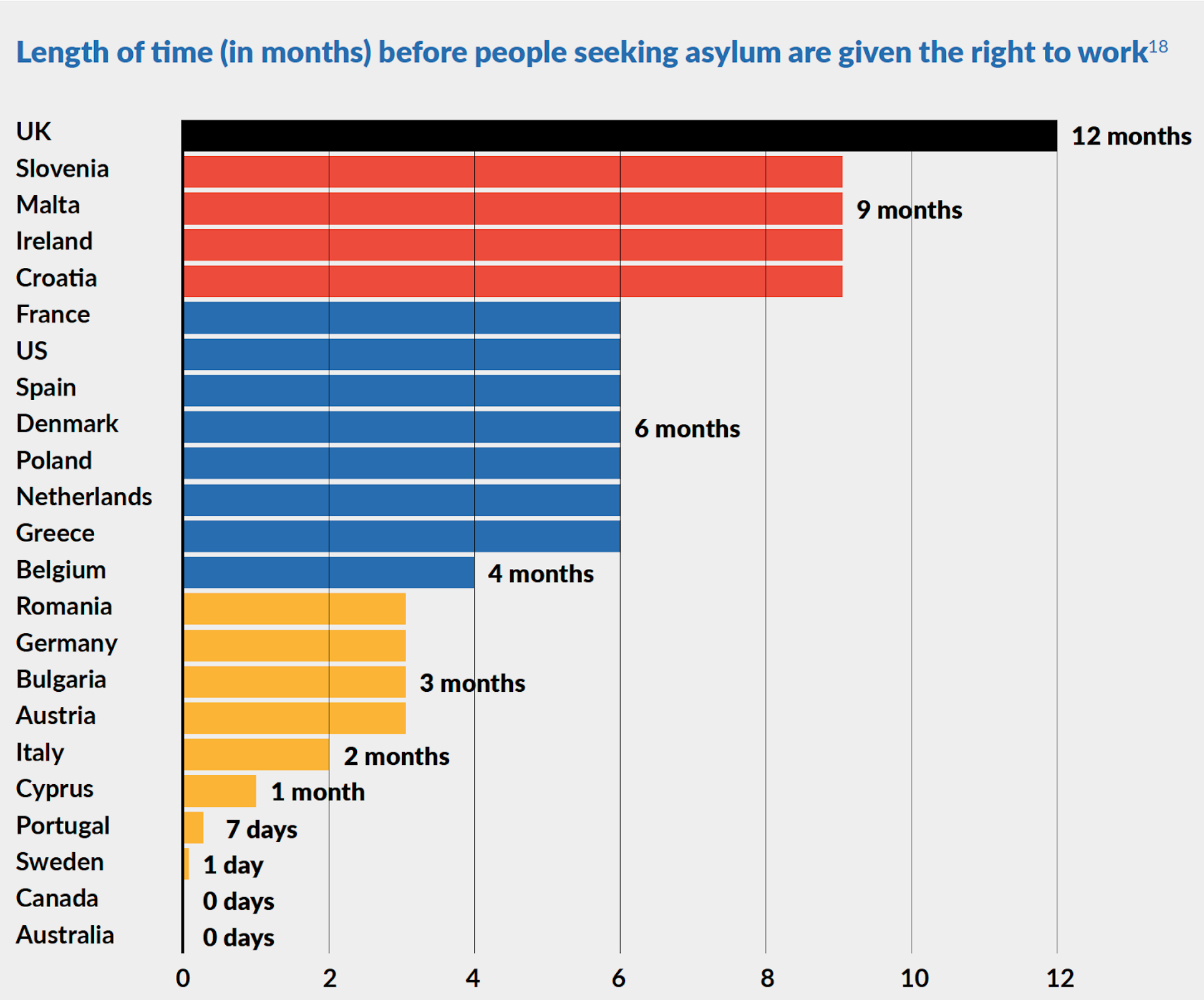menu
News
Right to Work for People Seeking Asylum

According to the National Audit Office, at the end of June 2024, the number of outstanding asylum claims awaiting an initial decision was around 86,000.
In addition, the number of appeals against asylum decisions has increased, as of March 2024, the number of appeals in the first-tier tribunal chamber stood at 27,133 compared with 7,510 at March 20231.
Under the current system, people seeking asylum are not permitted to work until they have been waiting for a decision for over 12 months, and even then only in limited occupations and dependents are not eligible at all2.
The core issue here is the amount of time the Home Office takes to make a decision, and the quality of that decision. The Green Party policy commits to decisions being made within three months (RA 504)3.
It is worth noting that these delays are by design, and not just the result of an increase in applications, in fact although recent years have seen a rise in numbers, in 2023 there were a similar number to those in 20024, with the levels regularly fluctuating due to global conditions.
Until the backlog of decisions is cleared, and the Home Office has put in place the resources to ensure that they can process applications promptly and with care, we need to recognise the people waiting are suffering from these delays.
Our policy RA 6065 is clear. All applicants of working age will be allowed to take up employment, with no restriction as to occupation.
Why allow people seeking asylum to work.
Allowing asylum seekers to work helps restore their dignity and sense of purpose. Being barred from working can lead to frustration and feelings of isolation.The right to work should be viewed as an essential human right.
Many of the people seeking asylum are being supported financially and accommodated by the Home Office in hotels. In 2023-2024 this support costs £4.7bn6. Allowing them to work has the potential to reduce these costs significantly.
Indeed, according to the Lift the Ban report, is estimated that the net benefit to UK economy of allowing people seeking asylum to work is £97.8m per year7, based on a conservative estimate of only 50% of people who are currently waiting more than six months for a decision on their initial asylum application are able to work full time on the national average wage.
The UK needs more workers, we have an acute labour shortage with 113k vacancies in the NHS8 and 152k vacancies in the adult social care sector9. The hospitality sector is reporting a 55k shortage10. The construction sector is reporting that it needs 251k new workers with 31% of construction firms reporting difficulties in recruiting skilled workers11. We also have reported shortages of tech workers, seasonal agricultural workers, and teachers among other sectors.
Imagine if the people seeking asylum, who are already living here, could be allowed to fulfil these vacancies. This is what happens in almost every other country in the world as shown by the graph below from the Lift the Ban report.

Critics argue that allowing work rights may act as a pull factor for asylum seekers. However, evidence from countries like Germany and Canada, which grant earlier work rights, shows no correlation between work access and an increase in applications12. People seeking asylum are driven to move by safety concerns, not employment opportunities.
In the UK, a recommendation for permission to work after six months has come from an All-Party Parliamentary Group on Migration and the All-Party Parliamentary Group on Poverty in June 2024, along with various private members’ bills from the Scottish National Party in recent years13.
Conclusion
The Green Party wants a fair and humane system of asylum. No one becomes a refugee lightly. People leave their homes, friends and often their family because they are forced to do so through circumstances that make remaining at home intolerable..
We believe that people seeking asylum, and their dependents, should be allowed to work and start rebuilding their lives immediately on arrival to the UK.
- National Audit Office, An Overview of the Home Office for the new Parliament 2023-24, published October 2024.
- https://www.gov.uk/government/publications/working-whilst-an-asylum-claim-is-considered/working-in-the-uk-whilst-an-asylum-case-is-considered
- https://migration.greenparty.org.uk/refugee-and-asylum-policy/
- https://commonslibrary.parliament.uk/research-briefings/sn01403/
- https://migration.greenparty.org.uk/refugee-and-asylum-policy/
- https://www.refugee-action.org.uk/lift-the-ban/
- https://migration.greenparty.org.uk/refugee-and-asylum-policy/
- https://researchbriefings.files.parliament.uk/documents/CBP-7281/CBP-7281.pdf
- https://www.skillsforcare.org.uk/Adult-Social-Care-Workforce-Data/Workforce-intelligence/documents/State-of-the-adult-social-care-sector/The-State-of-the-Adult-Social-Care-Sector-and-Workforce-2023.pdf
- https://www.ukhospitality.org.uk/insight/hospitality-workforce-strategy-one-year-on/
- https://ciobpeople.com/construction-workforce-forecast-highlights-ongoing-skills-gap/
- https://ecre.org/op-ed-pull-factors-the-myth-that-never-dies/
- House of Commons Library, Asylum seekers: the permission to work policy 26 July 2024
